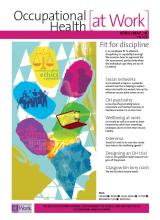April/May 2016 (vol. 12/6)
ContentsFeaturesNewsLegal
NewsResearch DigestResearch PlusCPD
Research Plus
Does poor mental health predict absence?
Previous research suggests a strong relationship between poor mental health and sickness absence; however, evidence from this large-scale national population-based study suggests the association may have been overestimated owing to a failure in earlier studies to control for confounding factors. Longitudinal data were obtained from the Household, Income and Labour Dynamics in Australia Survey. It covered 13,622 employees, re-interviewed annually in order to assess mental health and self-reported absence. Mental health scores were calculated using a subscale of The Short Form (36) Health Survey to assess frequency of anxiety symptoms and mood disturbance in the previous four weeks. Lower scores were associated with greater absence, but the effects were relatively small and only for those with more severe symptoms. After controlling for confounding factors – such as employment status, age, marital status, educational attainment and physical health – as well as unobserved heterogeneity, and focusing on within-person changes, only women with severe depressive symptoms (mental health score <53 out of 100) took more sickness absence (incidence rate ratio (IRR) = 1.10; CI 1.02–1.19). Absence was also slightly higher among men with mental health scores of: <53 (IRR = 1.13; CI 1.03–1.23); 53–60 (IRR = 1.14; CI 1.05–1.24); and 61–75 (IRR = 1.09; CI 1.01–1.16).
Scandinavian Journal of Work Environment and Health 2016; online first: doi: 10.5271/sjweh.3553.
Occupational Health at Work April/May 2016 (vol. 12/6) pp39-40



